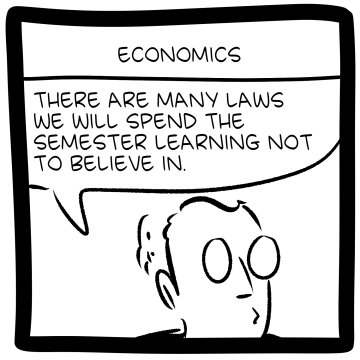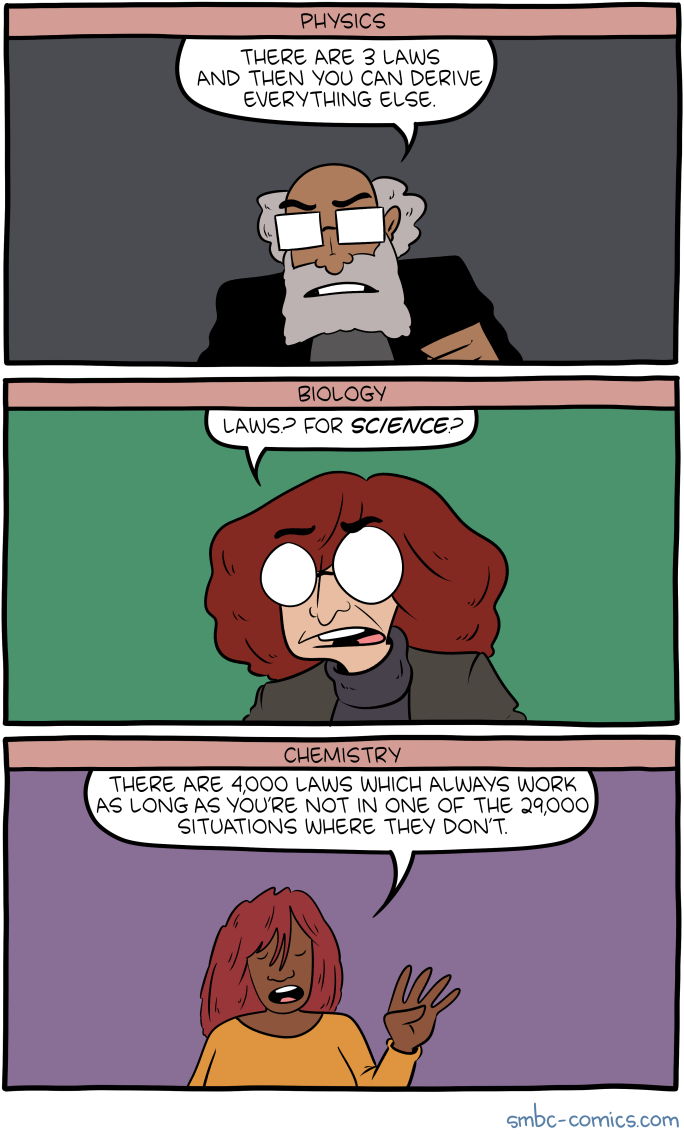Laws
« previous post | next post »
Yesterday's SMBC:
The mouseover title: "'This way of thinking bonds works great everywhere except anywhere in or near the middle of the period table'"
The aftercomic:

In linguistics, the Neogrammarians (and their descendants) invented/discouvered lots of "sound laws": Grimm's Law, Verner's Law, Grassmann's Law, etc. etc. etc.
More recent generalizations in linguistics have generally been called constraints (the "coordinate structure constraint") or generalizations ("Buzio's generalization") or rules or principles or etc.
I can't think of any recent linguistic "laws", but perhaps commenters can fill some in.
Update — in an adjacent area, there's Stevens' Power Law.
Update #2 — and in biology, contrary to the comic, there's Kleiber's Law (among others).

ahkow said,
February 24, 2021 @ 2:53 pm
Regarding your comment that there aren't recent linguistic "laws": What about Zipf's Law? Is that recent enough?
From the typology literature, there are also the "linguistic universals" proposed by Greenberg.
[(myl) I should have thought of Zipf's law — it's not exactly modern but it's not a neogrammarian-style sound law either.]
Bill Idsardi said,
February 24, 2021 @ 3:00 pm
Peter Avery and I consciously (and somewhat flippantly) tried to revive this tradition in our chapter in the Distinctive Feature Theory book (1999), offering up Kingston's Law and Vaux's Law. Bert liked this idea, John not so much.
Cosmo said,
February 24, 2021 @ 3:53 pm
There aren't enough maxims. Just Grice's really, I think? Maxim is a good word, it should get used more.
Y said,
February 24, 2021 @ 3:59 pm
Kuryłowicz's principles ("formules") of analogy are referred to as "laws" e.g. in Trask's Historical Linguistics.
z said,
February 24, 2021 @ 4:43 pm
@ Y
Trask, who was a specialist in Basque, may have been influenced by the use of this terminology in Basque historical linguistics. See "Linschmann's Law" (also known as Linschmann-Aresti Law) in his book The history of Basque, which, unlike the Neogrammarian Laws, is not the name a sound change. More recently other people have used the term "Trask's Law" (Trasken legea) for a generalization in Basque.
Bob Ladd said,
February 24, 2021 @ 5:52 pm
And don't forget Effects. The McGurk Effect is one that at least some Language Log regulars will know about.
(I have a colleague who always said it was his ambition to have an Effect named after him.)
[(myl) And the Ganong Effect! ]
David L said,
February 24, 2021 @ 6:07 pm
The Chemistry panel accurately captures my difficulties with organic chem many years ago.
Brett said,
February 24, 2021 @ 8:32 pm
At a meta level, I think it is interesting that this is a example of an SMBC in which the correct order is clearly: comic, then alt-text, then votey/aftercomic. I don't think I have noticed one in which this was the necessary order, although there are plenty of earlier comics in which the natural progression of the joke is: comic, votey, alt-text. That was the order in which the features were implemented on the site, so it makes some sense as the historically natural order. Of course, in most examples, you can read the votey and the alt-text in either order, so I wonder if the inversion of the traditional ordering was a conscious decision on Zach Wienersmith's part, or is was merely an organic outgrowth of the order in which he now produces the content elements.
Viseguy said,
February 24, 2021 @ 9:30 pm
"There are 4,000 laws which always work as long as you're not in one of the 29,000 situations where they don't."
Or in one of the 290,000,000 litigations to determine how they work.
Trogluddite said,
February 25, 2021 @ 11:20 am
According to Wikipedia, Muphry's Law was first cited as recently as 1992. I didn't have the patience to check the variants Umhoefer's Law, Skitt's Law, Hartman's Law, McKean's Law, and (Bell's) First Law of Usenet – but the last of those is obviously from the internet era. ;-)
Haamu said,
February 25, 2021 @ 11:29 am
As a nonscientist, I sense there is a joke (or two) here that I’m not getting.
How is the mouseover text to be parsed? I would delete the word “bonds,” but I assume it must make sense as given or one of you would have commented on it by now. And is “period” a typo for “periodic” or is that a joke?
Also, I have a vague appreciation for the point made in the chemistry panel, but couldn’t explain it to anyone or provide any supporting examples.
This is the first case where I wish there was an ExplainSMBC.com. I checked r/SMBCComics on Reddit but they were of no help.
Sally Thomason said,
February 25, 2021 @ 11:47 am
@ y and z: Trask may have been influenced in many ways by his knowledge of Basque, but that wouldn't be why he'd refer to Kurylowicz's predictive generalizations about analogic change as laws — it's the standard term for those (fatally flawed in my opinion) generalizations in historical linguistics, hardly original with Trask.
Terry Hunt said,
February 25, 2021 @ 1:47 pm
@Haamu – I think there may be a couple of mistakes in the mouseover text (which Prof. Liberman has transcribed accurately – I checked the original).
I'm guessing that it should read something like: "This way of thinking about bonds works great everywhere except anywhere in or near the middle of the periodic table.".
Jerry Friedman said,
February 25, 2021 @ 2:48 pm
Trogluddite: Skitt's Law is from alt.usage.english.
Terry Hunt: Thanks for making me realize that the mouseover text I read, "This way of thinking bonds great work everywhere except…", was not what was written.
Andreas Johansson said,
February 25, 2021 @ 3:08 pm
There are "laws" in biology – Dollo's Law and Williston's Law being two examples – but judging from Wikipedia generalizations in that discipline are more often called "rules":
https://en.wikipedia.org/wiki/Biological_rules
M. Paul Shore said,
February 25, 2021 @ 6:30 pm
If I might take the liberty of summarizing Sally Thomason’s comment in a limerick:
It wasn’t because Larry Trask
Was swayed by his knowledge of Basque
That he called, with their flaws,
Kury’s principles “laws”;
Nor did that old view stem from Trask.
M. Paul Shore said,
February 25, 2021 @ 7:38 pm
And a couple of footnotes to the limerick above: First, instead of writing “stem from” in the last line, I should’ve written the simpler, easier-flowing “start with”. Second, my ending the last line with “Trask” was a deliberate return to an old subtradition of limerick writing in which the end of the last line is identical to the end of the first line rather than rhyming with it—an approach that moreover was perfectly suggested by the content and organization of Prof. Thomason’s comment. I just mention that for the benefit of any readers unfamiliar with the subtradition, who might be thinking that the last line is defective and really needs a rhyming word like “ask”, “cask”, “flask”, or whatever.
Ryan Lai said,
February 28, 2021 @ 5:25 am
Some historical linguists are still naming sound changes as laws! Some people are still proposing quantitative linguistics laws as well: http://lql.uni-trier.de/index.php/Main_Page